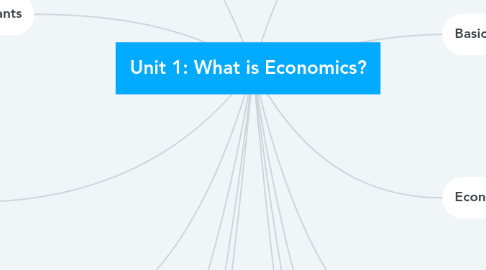
1. Economic Problems
1.1. Scarcity
1.2. Shortage
2. Needs and Wants
2.1. Goods
2.2. Services
3. Factors of Production
3.1. Land
3.2. Labor
3.3. Capital
3.4. Entrepreneur
4. Markets
4.1. Factor Market
4.1.1. where services of the factors of production are bought and sold
4.2. Product Market
4.2.1. where goods and services produced by businesses are sold to households
5. Production Possibility Curve
5.1. Economic Growth
5.1.1. Outward Shift
5.1.1.1. Technology
5.1.1.2. New Resources
5.1.1.3. Capital Accumulation
5.2. Economic Loss
5.2.1. Inward Shift
5.2.1.1. Loss of Resources
5.2.1.2. War
5.2.1.3. Natural Diseaster
5.2.1.4. disease
6. Trading
6.1. Comparative Advantage
6.1.1. if one person has an opportunity cost of performing a task is lower than the other's
6.2. Absolute Advantage
6.2.1. the ability to produce a good or service at a lower cost per unit than the cost of another entity
6.3. The Principle of Comparative Advantage
6.3.1. everyone does best when each person concentrates on the activities for which his or her opportunity cost is lowest
7. Free Enterprise System
7.1. Main Role
7.1.1. to protect citizens. regulations
7.2. Principles
7.2.1. Voluntary Exchange
7.2.2. Entrepreneurship
7.2.2.1. Profit Motive
7.2.3. Private Property Rights
7.2.4. Competition
7.2.4.1. Specialization
8. Economic Systems
8.1. Market Economy
8.1.1. people make economic decisions. individuals determine the questions of economics
8.2. Traditional Economy
8.2.1. uses habits, customs, and religion to determine the questions of economics
8.3. Command Economy
8.3.1. government makes the economic decisions. They own the land and capital
8.4. Mixed Economy
8.4.1. most economic are mixed
9. Basic Economics
9.1. Studies of Economics
9.1.1. Mircoeconomics
9.1.2. Macroeconomics
9.2. Ways to Look at the Economy
9.2.1. Positive Economics
9.2.2. Normative Economics
10. Economic Questions
10.1. What
10.1.1. goods are services should be produced?
10.2. How
10.2.1. should goods and services be produced?
10.3. Who
10.3.1. should receive the goods and services?
11. Efficiency
11.1. Productive Efficiency
11.1.1. utilizing all of its resources efficiently. maximum production
11.2. Allocative Efficiency
11.2.1. producing only types of goods and services that are more desirable while in high demand
12. Opportunity Cost
12.1. the best alternative we forgo when we make a choice or a decision
12.1.1. Constant Opportunity Cost
12.1.2. Increasing Opportunity Cost
13. The "isms"
13.1. Capitalism
13.1.1. laissez-faire - freedom. the government minimizes its interference with the economy but the government will step in to place legal restrictions on free enterprise
